小学阶段全部英语句型(70个)汇总
新人教版英语(3—5年级重点句型及语法)汇总大全
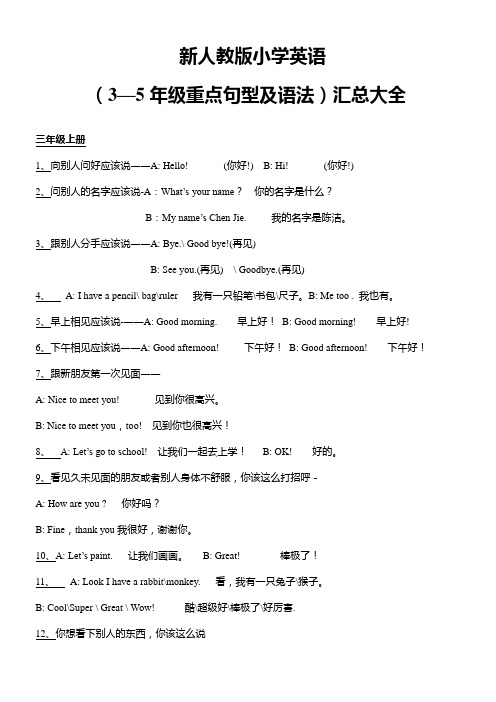
新人教版小学英语(3—5年级重点句型及语法)汇总大全三年级上册1、向别人问好应该说――A: Hello! (你好!) B: Hi! (你好!)2、问别人的名字应该说-A:What’s your name?你的名字是什么?B:My name’s Chen Jie. 我的名字是陈洁。
3、跟别人分手应该说――A: Bye.\ Good bye!(再见)B: See you.(再见) \ Goodbye.(再见)4、A: I have a pencil\ bag\ruler 我有一只铅笔\书包\尺子。
B: Me too . 我也有。
5、早上相见应该说-――A: Good morning. 早上好!B: Good morning! 早上好!6、下午相见应该说――A: Good afternoon! 下午好!B: Good afternoon! 下午好!7、跟新朋友第一次见面――A: Nice to meet you! 见到你很高兴。
B: Nice to meet you,too! 见到你也很高兴!8、A: Let’s go to school! 让我们一起去上学!B: OK! 好的。
9、看见久未见面的朋友或者别人身体不舒服,你该这么打招呼-A: How are you ? 你好吗?B: Fine,thank you我很好,谢谢你。
10、A: Let’s paint. 让我们画画。
B: Great! 棒极了!11、A: Look I have a rabbit\monkey. 看,我有一只兔子\猴子。
B: Cool\Super \ Great \ Wow! 酷\超级好\棒极了\好厉害.12、你想看下别人的东西,你该这么说――A: May I have a look? 我可以看一看吗?B: Sure. Here you are! 当然可以。
给你!13、请别人吃东西,你该这么说――A: Have some French fries. 吃一些炸薯条。
史上最全小学英语句型大全

史上最全小学英语句型大全史上最全小学英语句型大全what 问句;be动词句实物动词句情态动词句指示代词句询问年龄、姓名询问颜色询问数量和价询问时间或日期询问方位或地方询问想吃的东西询问天气状况询问身体状况或情绪询问职业、身份或人物询问兴趣、喜好询问通常做的事情询问正在做的事情询问将要做的事情询问曾经做过或发生过的事情一般疑问句“How”问句其他特殊疑问句where、who 等问句what问句What’s your name?What’s his /her name?what’s your hobby?What’s your favourite food ? what’s your job? What’s your father?What’s the time ? what’s the coulor? What’S the weather like? What’s this? What’s that ?What’s in the picture/ your schoolbag/your pencil-case/ the classroom?What do you like?What would you like? 询问吃东西What do you want?What do you do ?What does your father do?What does she do ?What about you?What does he like to do?What are you going to do after school/ this weekend/ this evening /this afternoon? What are you going to buy?What should we do then?What time is it?What does she do?It is yellow.What colour is it?What are they?What are you doing?What’s the matter?What’s the size?What do you see ?What are these?What do you do on the weekend?What’s your favourite season?What’s the weather like in spring?What would you like to do/eat?What is Zip’s favourite season?What’s the date today?What are they?What’s she doing?What are they doing?What is it doing?What are the ducks doing?What do ants like to eat?What do you have?What are you reading?What’s that?What do you do when you have the flu? What did you buy?What did you do last weekend?What about …?What do you want to do?What’s he/she/it like?这个人怎么样?What day is it today?What do you eat on Thursday?What do you do on weekends?What’s your favourite day/food/fruit? What can you /he /she /it do?be动词句。
小学英语常用句式总结归纳
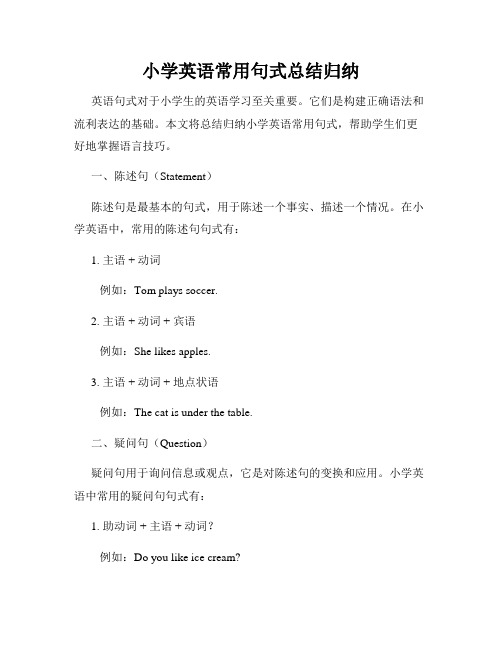
小学英语常用句式总结归纳英语句式对于小学生的英语学习至关重要。
它们是构建正确语法和流利表达的基础。
本文将总结归纳小学英语常用句式,帮助学生们更好地掌握语言技巧。
一、陈述句(Statement)陈述句是最基本的句式,用于陈述一个事实、描述一个情况。
在小学英语中,常用的陈述句句式有:1. 主语 + 动词例如:Tom plays soccer.2. 主语 + 动词 + 宾语例如:She likes apples.3. 主语 + 动词 + 地点状语例如:The cat is under the table.二、疑问句(Question)疑问句用于询问信息或观点,它是对陈述句的变换和应用。
小学英语中常用的疑问句句式有:1. 助动词 + 主语 + 动词?例如:Do you like ice cream?2. 疑问词 + 助动词 + 主语 + 动词?例如:What is your name?3. 特殊疑问句:疑问词 + 助动词 + 主语 + 动词?例如:Where do you live?三、祈使句(Imperative)祈使句用于请求、命令或建议,是对陈述句的变换和应用。
小学英语中常用的祈使句句式有:1. 动词原形 + 其他(主语、宾语)例如:Open the door.2. 动词原形 + 疑问副词 + 其他?例如:Please tell me your name.四、感叹句(Exclamation)感叹句用于表达惊讶、喜悦、赞美等情感。
小学英语中常用的感叹句句式有:1. How + 形容词 / 副词 + 主语 + 动词!例如:How beautiful the flowers are!2. What + 名词 + 主语 + 动词!例如:What a lovely dog!五、条件句(Conditional)条件句用于表达条件和结果之间的关系。
小学英语中常用的条件句句式有:1. If + 条件句,结果句。
例如:If it rains, we will stay at home.2. 条件句(从句)+ 助动词 + 结果句(主句)。
人教版小学英语-1-6年级-句型分类汇总
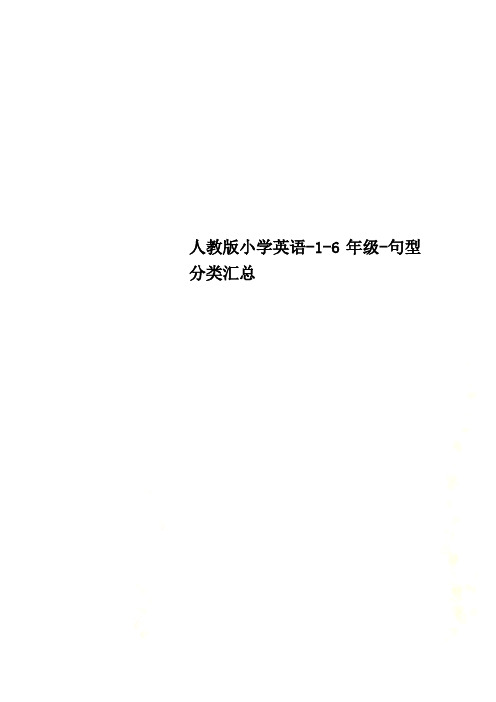
人教版小学英语-1-6年级-句型分类汇总小学英语句型分类汇总一.见面打招呼。
1、 ----Hello! 你好!----Hello! 你好!2、 ----Good morning! 早上好!----Good morning! 早上好!3、---Nice to meet you ! 很高兴认识你!---Nice to meet you, too! 我也很高兴认识你!一.询问姓名、年龄。
1、 ----What’s your name? 你叫什么名字?----My name is……. 我叫……。
2、 ----How old are you? 你几岁了?----I’m 12. 我十二岁。
二.询问颜色。
1、----What colour is it? 它是什么颜色的?----It’s yellow . 黄色。
2、 ----What colour are they? 它们是什么颜色的?----They’re green. 绿色的。
三.询问数量或价钱。
1、----How many people are there in your family?你家有几口人?----Three. 三口人。
2、----How much are these apples? 这些苹果多少钱?----They’re thirty-five yuan. 三十五元。
四.询问时间或日期。
1、 ----What time is it now? 现在几点钟?----It’s nine o’clock.九点。
1、 ----What’s the weather like in Beijing?北京的天气如何?----It’s sunny . 今天是晴天。
八.询问身体状况或情绪。
1、 ----How do you feel? 你感觉如何?----I feel sick. 我觉得不舒服。
2、 ----What’s the matter? 怎么了?----I have a cold. 我感冒了。
(完整版)人教版小学英语所有句型总汇

学会提问,学会学习What:1.What’s your name?2.What’s in the picture/ your schoolbag/ your pencil-case/ the classroom? There is a../There are….3.What do you like? --- I like…4.What’s your father? ---He is a …. 5.What would you like?----I’d like …. 6.What’s this?----It’s a /an…7.What’s his /her name?---His /Her name is…8.What’s your hobby?----Reading is my hobby.9.What do you do ? ----I am a student.What does he /she/your mother/father do? ---He /She is a …What do you do on the weekend?—I usually/often/sometimes climb mountains. 10.What time is it?----It’s …11. What can you do ?–---I can clean the room.12.What colour is it?It’s red/yellow/blue/orange/brown/black/white 13.What are they?---They are … 14.What are you doing?――They are rea ding.15.What’s the weather like in Beijing?—It’s sunny/cloudy/windy/rainy/snowy. 16.What size?—size 2317.What’s your favourite season?---I like spring/summer/fall/winter.18.What’s the weather like in spring?—It’s warm and sunny.19.What would you like to do/eat?---I’d like some meat.20.What’s the date today?---It’s March.1.201121.What are they?---They are…22.What’s she doing?---She is running. 23.What are they doing?—They are running.24.What is it doing?---It is eating. 25.What are the ducks doing?—They are swimming.26.What do you have?----I have English, Chinese and math.27.What are you reading?----They are reading story-books. 28.What’s that?-----It’s a /an…29.What do you want to do?----I want to go shopping.30.What’s he/she/it like?—He/She is tall/short/quiet/active/smart/strong/thin/kin d.31.What day is it today?---It’s Monday /Tuesday/Wednesday/Thursday/Thursday/ Friday/Satuday/Sunday32.What do you have on Thursday?---We have English, Chinese and Math. 33.What do you do on weekends?---I usually do my homework/watch TV/Clean my room…34.What’s your favourite day/food/fruit? ----I like….35.What can you /he /she /it do?----She /He can go ….36. What are you going to do on the weekend?—I am going to ….37.What are you going to buy?----I am going to buy…38.What are you going to be?---I am going to be a teacher.39.What did you buy?----I bought a pair of slippers.40.What should we do then?---We should …41. What’s your hobby?---I like collecting stamps.42. What’s the matter?---I have a headache/earache/sore ache.My nose hurts.43.What did you do last weekend?---I played football….How1.How are you?2. How about you?3. How old are you?4. How many candles balloons /books /gifts are there?----There are 3.5.How do you go to school /Canada?---I go to school by bike.6. How can I get to Zhongshan Park /the zoo?----You can take No.1 bus.7. How do you go there?---I go there on foot.8. How does he/she go to school/ work?---He/She goes to school by bus.9. How do you plant flowers?----Put the seed in the soil…10. How tall /old/heavy are you?----I am…11. How does the water become vapour?12. How big are your feet?13.How long are your legs?14.How large is your room?15.How long is your bed?16.How many students are there in your class?---There are 60 students.17.How much is it/are they?18.How does Amy feel?Where1. Where is my seat/the trash bin/ your pen?---It’s on/in /under/near/in front of /behin d the …2.Where are the keys/ my shoes/ they?---They are at home./in the classroom.3.Where is your home /hospital/ cinema/ bookstore /library/ museum /shoe store?–It’s near the school.4. Where do you live?—I live in China.5.Where does he work?---He works at school.6.Where is the canteen/library/ art room? ----It’s on the first floor.8.Where are you from?—I am from China.9.Where is your mouth?---Here it is.10.Where does the rain/cloud /vapour/ flower come from?----It comes from…11. Where did you go on your holiday?---I went to a park….When and who1. When do you get up/ go to school/have English class/have lunch/play sports/have dinner?2. Who’s your friend/principal/he?3. Who’s your math teacher?下面是一般疑问句1.Is she in the study? Yes, she is/No, she isn’t.2.Is there a cinema near here?---Yes, there is./No, there isn’t.3. Is it far from school?—Yes, it is.4. Is your pen pal a boy or a girl?—Yes, it is. /No, it isn’t.5. Is this the library/TV room/teacher’s desk /your bedroom/ your aunt?—Yes, it is./No, i t isn’t.6. Is that a picture?—Yes, it is./No, it isn’t.7. Is your birthday in February?---- Yes, it is./No, it isn’t.8.Is he watching ants?----Yes, he is./No, he isn’t. 9. Is she your sister?--- Yes, she is/No, she isn’t.10.Is she/he young/kind/strict/active/quiet/old? ---Yes, she is/No, she isn’t.10.Are they nice/ sheep/ all right?—Yes, they are./No, they aren’t.11.Are those cucumbers? —Yes, they are./No, they aren’t.12. Are you under the table? ---Yes, I am . /No, I am not.13.Are you helpful at home?---Yes, I am . /No, I am not.14. Are there any bridges in your village?---Yes, there are. /No, there aren’t.1. Can I have some chicken/ a Coke?---Yes, please. /Sorry, you can’t.2. Can I go on foot?---- Yes, please. /Sorry, you can’t.3. Can you go by ship or train?---- Yes, I can . /No, I can't.4. Can he go with us?—Yes, he can. /No, he can’t.5. Can you help me go up to the sky?—Sorry, I can’t.6. Can I have a try?-- Yes, please.7. Can I wear my T-shirt?--- Yes, please. /Sorry, yo u can’t. It’s cold.8. Can I help you?9. Can I ask your some questions?----Sure.10. Can tigers swim?---Yes, it can.11. Can you read this/play football/do housework?----Yes, I can .12. Can I have an apple, please?----Sure, here you are.1. Do you like sports/ pears/apples?----Yes,I do./No, I don’t.2. Do you know the traffic rules? ----Yes, I do./No, I don’t.3. Do you have a comic book/ a library/any new teachers ? ----Yes, I do./No, I don’t.4. Do you have lunch at school? ----Yes, I do./No, I don’t.5. Do you want to be my friend? ----Yes, I do./No, I don’t.6. Does he go to school by car?----Yes, he does./No, he doesn’t.7. Does he live n the country? ----Yes, he does./No, he doesn’t.8. Does she teach English? ----Yes, she does./No, she doesn’t.9. Does she have a computer? ----Yes, she does./No, she doesn’t.上述共110个句子。
(新标准)小学英语句型汇总

(新标准)小学英语句型汇总M1 问候语:Good morning/afternoon/evening! Good bye.How are you? I’m…自我介绍: Hello! I’m …M2 询问姓名及回答:What’s your name? I’m…/My name isM3 祈使句:Sit down., please. Stand up, point to…M4 介绍语言:It’s red (blue, yellow, green,black…).It’s a black dog.M5询问个数: How many?M6 询问物体及回答:What’ this /that? It’s a …..M7问年龄:How old are you? I’m …..M8 一般疑问句:Is it a ….? Yes, it is. /No, it isn’t.在哪里:Where’s the cat? It’s in the bag.(用介词回答)M9 介绍家人:This is my mother/father/grandma/grandpa/sister/brother.He’s …. She’s …..M10 介绍人体部位:This is his/her…祈使句:Point to /Touch his/her…(新标准)小学三年级起始第二册M1 询问喜欢:What’s your favorite …? My favourite … is ….M2 询问及回答名称:What’s this? It’s a tiger.What are they? They’re monkeys.陈述特点:It’s big. They are small.M3 陈述自己的喜好:I like….. I don’t like …..M4 谈论喜好:Do you like meat? Yes, I do. No, I don’t.Does Daming like bananas?Yes, he does. No, she doesn’t.Tom likes milk.M5询问时间与回答:What’s the time, please? It’s half past five.M6询问活动与回答:What do you have at school? I have…What do you do at the weekend? I …What does Lingling have at school?/ do at the weekend? She…Do you play football in the morning? Yes, I do. / No, I don’t.陈述第三人称:She has music. He watches TV.M7 介绍节日:Happy New Year! Happy Christmas!It’s Chinese New Year today. It’s Spring Festival.We have a big family dinner.We have Christmas in England.They sing songs at Christmas.M8 陈述四季:In spring /summer /autumn /wi nter, it’s warm and sunny /hot /cool /cold. In summer /winter, it often rains /snows.提问活动:What do you do in summer? I go cycling.M 9谈论拥有物品:Have you got a book, too? Yes, I have. No, I haven’t.I’ve got a new book. It’s about animals. (第一人称)Has Sam got a sweater? Yes, he has. No, he hasn’t.Tom has got a blue T-shirt.(第三人称)说明乘坐交通工具:She goes to school by bike. She walks to work.M 10 询问与说明位置:Where’s the apple?It’s in the box. It’s on your desk.It’s under the chair.第三人称单数:In spring, Daming flies kites in the park.In winter, he walks on the snow.(新标准)小学三年级起始第三册M1 所属关系:Have you got an elephant? Yes,I have. \ No, I haven’t .I ’ve got twenty-two points.加法的表达: Twenty and one is twenty-one.M2询问地点和指路:Excuse me ,where’s West Lake Road ,p lease?Go straight on \ Turn right \ Turn leftM3 现在进行时态:What are you doing ? I am talking to you .She ’s watching TV.M4现在进行时态: What are they doing? They are doing taiji.(明确人称与系动词的搭配)M5询问是否想要某种食物:Do you want some rice?Yes, please. No ,thank you .询问有没有: Have you got chopsticks in England?Yes, I’ve got. / No, I haven’t.M6 询问能力:Can you ……? Yes , I can . / No , I can ‘t .I can ……/ I can’t ……M7一般将来时态陈述句: I’m going to …(人称与系动词的搭配)M8一般将来时态特殊疑问句: What are you going to… ?What is she/he going to…?I’m (He’s/She’s)going to……M9 请求吃喝:Can I have some ……?Yes ,you can . / Sorry ,you can’t .M10 There be 句型: How many……in May? There are/is ……(新标准)小学三年级起始第四册Module 1 描述人物特点: He/She is very +形容词Module 2 描述物体特点:It is very +形容词Module 3 一般将来时态询问\介绍打算:Will you take…? I will…Module 4 一般将来时态一般疑问句:Will it be …? They will …Module 5 形容词比较级:He/She is +比较级+than…Module 6 运用形容词、副词比较级的不规则形式:I think this girl is better then the first girl.Amy is worse than Sam.Module 7 询问、描述地理位置:Where is New York\ San Francisco\ Washington D.C.?It’s in the east/west/south/north.Module 8 一般过去时态陈述句: I was… You were… They were…否定句: They weren’t… She/ He wasn’t反义词:old---young, long---short, cute---naughty,tall---short, fat---thin.Module 9 一般过去时态一般疑问句: Did you…? Yes, I did. No, I didn’t.Module 10 一般过去时态特殊疑问句:What happened to you?(新标准)小学三年级起始第五册M1 一般过去时态疑问句When did you come back? I came back last Sunday.Did you do something? Yes, I did. / No,I didn’t.M2. 问多少及回答: How much + n不可数…? KilosHow many + n可数…? Numbers/ kilosHow many bananas do you want? Six, please.How much milk do you want? Three bottles/boxes, please.M3 一般过去时态疑问句What did you do at the weekend? I visited…Where did you go last Sunday? I went to…M4 说明物品的所属关系名词性物主代词:Whose bag is it? It’s mine(yours, his, hers, Lingling’s)表示有生命东西(人或动物)的所有格构成:名词词尾+ ‘S 如:Tom’s bicycle / lingling’s bag以s结尾的复数名词则加‘ 如:my brot hers’ roomM5. There be 句型:There are enough + n复数 :There are enough pencils.There are too many+ n复数: There are too many apples in the bag. There are + n复数: There are 25 children in the class.There are /aren’t enou gh.M6 表达能够和不能够:Can you run fast /control the ball/ jump high/catch the ball well? Yes, I can./ No, I can’t. /Very badly. (很糟糕)I think I can do that well.You can…自我评价.评价他人: well, badly, good, fantasticI can …well/badly.You can be a good goalkeeper.Lingling is a fantastic goalkeeperM7 描述特征:He/ She is + adj( blind/deaf ).表达能力:He/She/They can’t … He/ She can’t walk/ hear/see.代词宾格:This dog + helps +him/ her/them.These firemen help them.M8 根据课文回答特殊疑问句What time does school start?My school starts at nine o‘clock.Where did Lingling go yesterday?What do/ did they do in the playground?M9. 表述情绪和感受(feelings):Are you feeling sad/ bored/ angry/ happy/ tired/ hungry/ surprise/thirsty? How do you feel? Now, I feel…M10 应该与不应该:You should/shouldn’t…1. You shouldn’t walk in the road.2. You should look before you cross the road.3. You should hold my hand when we cross the road.4. You should take the right child.5. You should say hello to my friends.Tom, say hello to my friendsBook5中祈使句:1. Let’s buy some. (M1)2. Let’s go to the supermarket. (M2)3. Let’s buy one kilo of noodles. (M2)4. Let’s make a list. (M2)5. Let’s take my skipping rope. (M8)6. Look at this ice cream. (M1)7. Don’t argue. (M4)8. Please give out the pencils. (M5)9. Give one pencil to every child. (M5)10. Give them out, Sam. (M5)11. Be careful! (M5)12. Tell me, please. (M9)13. Tom, say hello to Pam, please.(M10)Book5中常见口语句型:1. Do you live in …? I come from… (M1)2. What about …? What about juice. (M2)3. How well do you do …?How well do you play football. (M6)4. Would you like to do …?Would you like to come to school with us? (M8)5. What time…? What time does school start?6. Thank sb for sth.Thank you very much for my beautiful book. (M9)7. Do you want to do…? Do you want to play chess? (M9)8. 给你……:Here’re your oranges. (M2)Here is your dinner. (M7)(新标准)小学三年级起始第六册Module 1 一般过去时态陈述句/ There be 句型1\There were n’t any + n复数:There weren’t any buses.2\There was + n单数: There was a small house.3\There are lots of + n复数: There are lots of buses and cars. 4\There is + 单数:There is a big house.Module 2 一般过去时态疑问句Did she\he learn any foreign languages?What did she\he do yesterday?He\she was a …Module 3 一般过去时态“三餐吃什么”句型结构:What did you\she\he have for breakfast\lunch\dinner?I\She\He had…Module 4 在某地能找到某物:Where can you find out about…?You can find it…in/on/at…Module 5 形容词描述物体:It’s light and big. It’s easy for you.Module 6 一般过去时态描述旅行:I went there last year. / I rode a horse./ I climbed a mountain.表达方位:It’s in the south / north /west /east of China.Module 7 怎样发送电子邮件Let’s send an email. Click on e-mail. Click on “write”.Write your message. Click on “send”.Module 8 询问建议:What do you suggest?提供建议:What/ How about chopsticks?Why don’t you give him a kite?是否同意: That’s great/a good idea. I agree. /I think so.I don’t think so.作比较句型: A is the same as B./A is + 形容词比较级(than B).Module 9 一般过去时态:The men wore women’s clothes.The actors told lots of jokesWe laughed a lot.We all ate hamburgers and chips.一般将来时态陈述句We are going to see you in three weeks.Dad’s going to put another bed in my room. He is going to ask you some questions. Module 10 一般将来时态特殊疑问句谈论旅游准备情况:Where are you going to go? What are you going to do?When are you going to go?Who’s going to go?。
小学英语语法句型归纳总结

小学英语语法句型归纳总结英语作为一门国际语言,学习英语语法对于小学生来说是至关重要的。
掌握英语语法句型,不仅能够帮助学生更好地理解英语的用法,还能够提高他们的英语表达能力。
下面是对小学英语语法句型的归纳总结:一、简单句型1. 主语 + 动词(及物或不及物)例如:- I eat an apple.(我吃一个苹果。
)- They run in the park.(他们在公园里跑。
)2. 主语 + 动词 + 宾语例如:- She reads a book.(她读一本书。
)- Tom throws a ball.(汤姆扔一个球。
)3. 主语 + 系动词(be动词)+ 表语例如:- I am a student.(我是一个学生。
)- The flower is beautiful.(这朵花很漂亮。
)4. 主语 + 系动词(be动词)+ 地点例如:- The book is on the table.(书在桌子上。
)- The cat is under the chair.(猫在椅子下面。
)二、疑问句1. 一般疑问句使用助动词do、does或did加在句子的主语前,然后再加上动词原形。
例如:- Do you like ice cream?(你喜欢冰淇淋吗?)- Does he play basketball?(他打篮球吗?)2. 特殊疑问句特殊疑问句是用来询问特定信息或细节的问句,通常以疑问代词开头。
例如:- What is your name?(你叫什么名字?)- When is your birthday?(你的生日是什么时候?)- Where do you live?(你住在哪里?)在句子前面加上否定词,通常为don't、doesn't或didn't。
例如:- I don't like pizza.(我不喜欢披萨。
)- He doesn't have a pet.(他没有宠物。
小学英语句型大全汇总翻译

小学英语句型大全汇总翻译一、问候和自我介绍1. Hello! 你好!2. Hi! 嗨!3. Good morning/afternoon/evening! 早上/下午/晚上好!4. How are you? 你好吗?5. I'm fine, thank you. 我很好,谢谢。
6. What's your name? 你叫什么名字?7. My name is (name). 我叫(名字)。
8. Nice to meet you! 很高兴认识你!二、询问与回答1. What is this? 这是什么?2. This is a (object). 这是一个(物品)。
3. What color is it? 它是什么颜色的?4. It is (color). 它是(颜色)的。
5. Is this a (object)? 这是一个(物品)吗?6. Yes, it is. 是的,是这样的。
7. No, it isn't. 不,不是这样的。
8. Are you (age) years old? 你(年龄)岁了吗?9. Yes, I am. 是的,我是(年龄)岁了。
10. No, I'm not. 不,我不是。
三、简单对话1. Can you help me? 你能帮助我吗?2. Yes, what do you need? 是的,你需要什么?3. I need (object). 我需要(物品)。
4. Here you are. 给你。
5. Thank you! 谢谢!6. You're welcome! 不客气!7. Where are you from? 你来自哪里?8. I am from (country). 我来自(国家)。
9. What is your favorite food? 你最喜欢的食物是什么?10. My favorite food is (food). 我最喜欢的食物是(食物)。
小学英语句型归纳总结大全
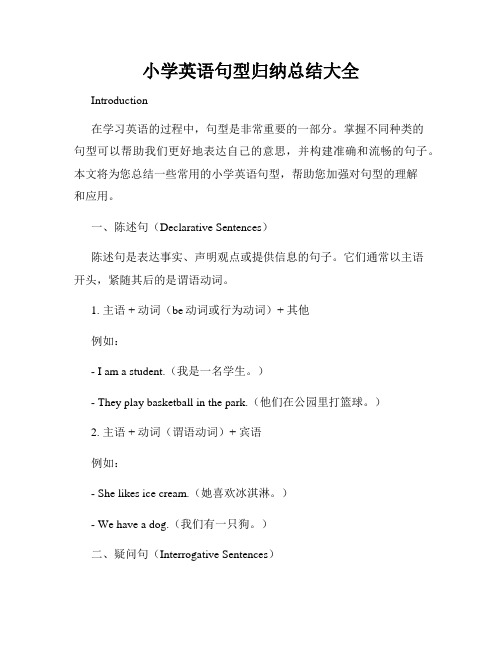
小学英语句型归纳总结大全Introduction在学习英语的过程中,句型是非常重要的一部分。
掌握不同种类的句型可以帮助我们更好地表达自己的意思,并构建准确和流畅的句子。
本文将为您总结一些常用的小学英语句型,帮助您加强对句型的理解和应用。
一、陈述句(Declarative Sentences)陈述句是表达事实、声明观点或提供信息的句子。
它们通常以主语开头,紧随其后的是谓语动词。
1. 主语 + 动词(be动词或行为动词)+ 其他例如:- I am a student.(我是一名学生。
)- They play basketball in the park.(他们在公园里打篮球。
)2. 主语 + 动词(谓语动词)+ 宾语例如:- She likes ice cream.(她喜欢冰淇淋。
)- We have a dog.(我们有一只狗。
)二、疑问句(Interrogative Sentences)疑问句用于提问,通常以特殊疑问词开头或在陈述句的基础上将句子的主谓位置颠倒。
1. 特殊疑问词(Where, What, How等) + 动词 + 主语 + 其他例如:- Where do you live?(你住在哪里?)- What is your favorite color?(你最喜欢的颜色是什么?)2. 动词 + 主语 + 其他?例如:- Do you like sports?(你喜欢运动吗?)- Can they swim?(他们会游泳吗?)三、祈使句(Imperative Sentences)祈使句用于表达请求、建议、命令或邀请等。
1. 动词 + 其他例如:- Sit down, please.(请坐。
)- Open the window.(打开窗户。
)2. Let's + 动词原形 + 其他例如:- Let's play soccer.(我们来踢足球吧。
)- Let's have a picnic this weekend.(我们这个周末去野餐吧。
小学英语必学重点句型大全
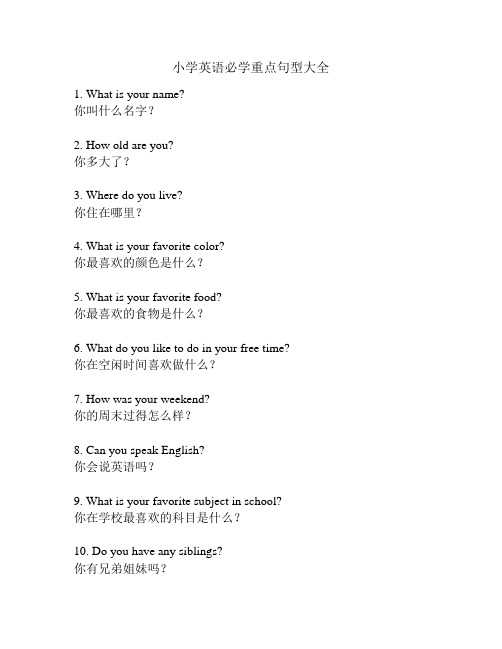
小学英语必学重点句型大全1. What is your name?你叫什么名字?2. How old are you?你多大了?3. Where do you live?你住在哪里?4. What is your favorite color?你最喜欢的颜色是什么?5. What is your favorite food?你最喜欢的食物是什么?6. What do you like to do in your free time?你在空闲时间喜欢做什么?7. How was your weekend?你的周末过得怎么样?8. Can you speak English?你会说英语吗?9. What is your favorite subject in school?你在学校最喜欢的科目是什么?10. Do you have any siblings?你有兄弟姐妹吗?11. Where did you go on your last vacation?你上次的假期去了哪里?12. What do you want to be when you grow up? 你长大后想成为什么?13. Can you play a musical instrument?你会演奏乐器吗?14. What is your favorite movie/book/song?你最喜欢的电影/书籍/歌曲是什么?15. Do you have any pets?你养宠物吗?16. What time do you go to bed?你几点睡觉?17. What is your favorite sport?你最喜欢的运动是什么?18. What is your favorite animal?你最喜欢的动物是什么?19. What is your favorite season?你最喜欢的季节是什么?20. What is your favorite holiday?你最喜欢的假日是什么?。
三年级到六年级重点句型

三年级到六年级重点句型小学英语的学习对于孩子们来说是打基础的重要阶段,而掌握重点句型则是提高英语水平的关键。
以下是为大家整理的三年级到六年级的重点句型。
三年级重点句型:1、“Hello! /Hi!” 这是最常见的打招呼用语,表示“你好!”2、“Good morning / afternoon /evening” 分别用于早上、下午和晚上的问候。
3、“What's your name?” 询问对方的名字。
4、“My name is ____” 回答自己的名字。
5、“Nice to meet you” 表示“很高兴见到你。
”6、“How are you?” 用于询问对方的近况,“I'm fine, thank you And you?” 是常见的回答。
7、“This is ____” 介绍某人或某物,比如“This is my friend, Tom”8、“Let's go” 意思是“让我们走吧。
”四年级重点句型:1、“Where is the ____?” 用于询问某物在哪里,例如“Where is the library?”2、“It's on / in / under the ____” 回答位置,“on”表示在上面,“in”表示在里面,“under”表示在下面。
3、“How many ____ do you have?” 询问数量。
4、“I have ____” 回答拥有的数量。
5、“What colour is it?” 询问颜色。
6、“It's ____” 回答颜色。
7、“Can I have some ____?” 表示请求得到某物。
8、“Sure Here you are” 表示同意并给予。
五年级重点句型:1、“There be”句型,如“There is a book on the desk” 表示“在桌上有一本书。
”2、“There are some apples in the basket” 当表示多个物品时用“are”。
人教版小学英语重要句型归纳

三年级上册1. ---What’s your name ——你的名字是什么?--- My name is Chen Jie. ——我的名字是陈洁。
2. --- This is John, ——这是约翰。
---Nice to meet you. ——见到你很高兴。
3. ---How are you ——你好吗?---I’m fine, thank you. ——我很好。
谢谢。
4. ---Let’s paint. ——让我们一起画画吧。
---Great. ——太好了。
5. ---Look! I have a rabbit. ——看!我有一只兔子。
---Cool. ——真酷!6. ---May I have a look ——我能看一下吗?---Sure. Here you are. ——当然可以,给你。
7. I like hamburgers. ——我喜欢汉堡包。
8. ---Have some French fries. ——吃一些薯条吧。
---Thank you. ——谢谢。
9. ---Can I have some chicken ——我可以吃一些鸡肉吗?--- Sure. Here you are. ——当然可以,给你。
10. ---How old are you ——你几岁了?---I’m 9. ——我9岁。
11. ---How many balloons ——有多少只气球?---4. ——4只。
三年级下册1. ---Where are you from ——你来自哪里?--- I’m from America. ——我来自美国。
2. --- Who’s that woman ——那位女士是谁?---She’s my mother. ——她是我的妈妈。
3. --- Who’s that man ——那位男士是谁?---He’s my father. ——他是我的爸爸。
4. ---How many kites can you see ——你能看见多少只风筝?---I can see 12 ——我能看见12只。
小学英语基本句型总结
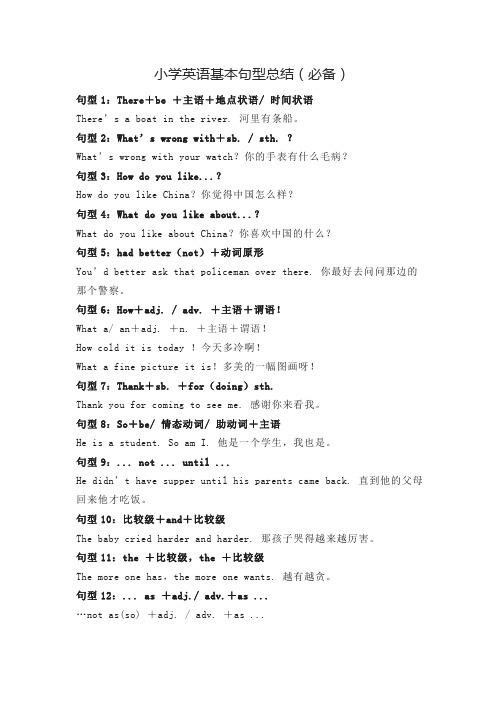
小学英语基本句型总结(必备)句型1:There+be +主语+地点状语/ 时间状语There’s a boat in the river. 河里有条船。
句型2:What’s wrong with+sb. / sth. ?What’s wrong with your watch?你的手表有什么毛病?句型3:How do you like...?How do you like China?你觉得中国怎么样?句型4:What do you like about...?What do you like about China?你喜欢中国的什么?句型5:had better(not)+动词原形You’d better ask that policeman over there. 你最好去问问那边的那个警察。
句型6:How+adj. / adv. +主语+谓语!What a/ an+adj. +n. +主语+谓语!How cold it is today !今天多冷啊!What a fine picture it is!多美的一幅图画呀!句型7:Thank+sb. +for(doing)sth.Thank you for coming to see me. 感谢你来看我。
句型8:So+be/ 情态动词/ 助动词+主语He is a student. So am I. 他是一个学生,我也是。
句型9:... not ... until ...He didn’t have supper until his parents came back. 直到他的父母回来他才吃饭。
句型10:比较级+and+比较级The baby cried harder and harder. 那孩子哭得越来越厉害。
句型11:the +比较级,the +比较级The more one has,the more one wants. 越有越贪。
小学必背英语句型大全
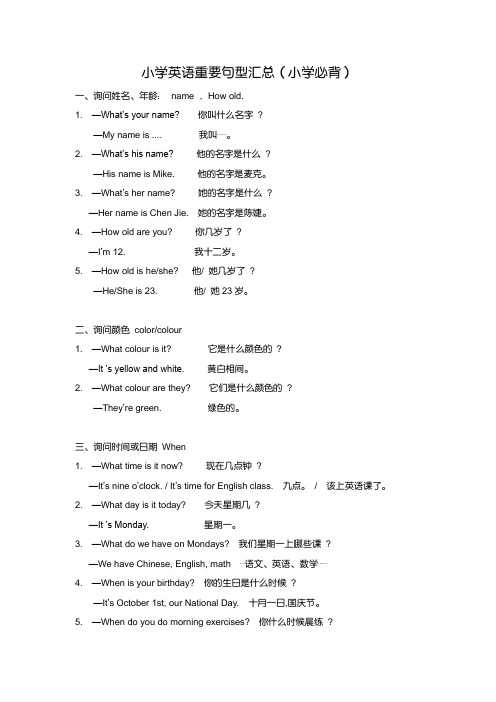
小学英语重要句型汇总(小学必背)一、询问姓名、年龄:name ,How old.1. —What’s your name? 你叫什么名字?—My name is .... 我叫⋯⋯。
2. —What’s his name? 他的名字是什么?—His name is Mike. 他的名字是麦克。
3. —What’s her name? 她的名字是什么?—Her name is Chen Jie. 她的名字是陈婕。
4. —How old are you? 你几岁了?—I’m 12. 我十二岁。
5. —How old is he/she? 他/ 她几岁了?—He/She is 23. 他/ 她23岁。
二、询问颜色color/colour1. —What colour is it? 它是什么颜色的?—It ’s yellow and white. 黄白相间。
2. —What colour are they? 它们是什么颜色的?—They’re green. 绿色的。
三、询问时间或日期When1. —What time is it now? 现在几点钟?—It’s nine o’clock. / It’s time for English class. 九点。
/ 该上英语课了。
2. —What day is it today? 今天星期几?—It ’s Monday. 星期一。
3. —What do we have on Mondays? 我们星期一上哪些课?—We have Chinese, English, math ⋯语文、英语、数学⋯⋯4. —When is your birthday? 你的生日是什么时候?—It’s October 1st, our National Day. 十月一日,国庆节。
5. —When do you do morning exercises? 你什么时候晨练?—I usually do morning exercises at 8:30. 我通常8:30晨练。
(完整版)小学英语句型句式
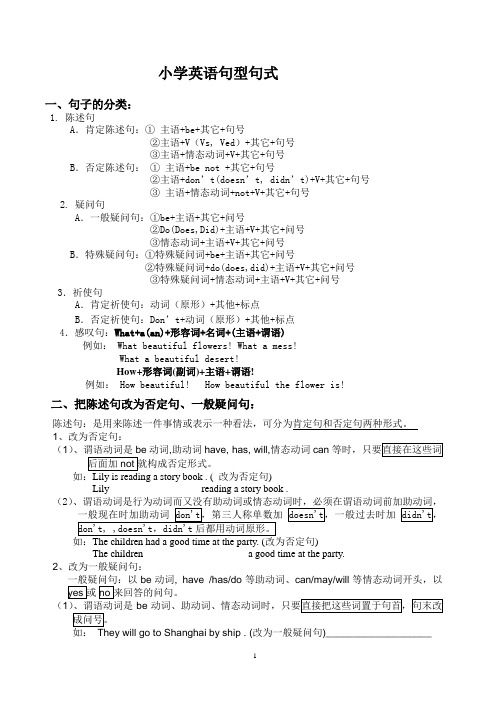
小学英语句型句式一、句子的分类:1. 陈述句A.肯定陈述句:①主语+be+其它+句号②主语+V(Vs, Ved)+其它+句号③主语+情态动词+V+其它+句号B.否定陈述句:①主语+be not +其它+句号②主语+don’t(doesn’t, didn’t)+V+其它+句号③主语+情态动词+not+V+其它+句号2. 疑问句A.一般疑问句:①be+主语+其它+问号②Do(Does,Did)+主语+V+其它+问号③情态动词+主语+V+其它+问号B.特殊疑问句:①特殊疑问词+be+主语+其它+问号②特殊疑问词+do(does,did)+主语+V+其它+问号③特殊疑问词+情态动词+主语+V+其它+问号3.祈使句A.肯定祈使句:动词(原形)+其他+标点B.否定祈使句:Don’t+动词(原形)+其他+标点4.感叹句:What+a(an)+形容词+名词+(主语+谓语)例如: What beautiful flowers! What a mess!What a beautiful desert!How+形容词(副词)+主语+谓语!例如: How beautiful! How beautiful the flower is!二、把陈述句改为否定句、一般疑问句:陈述句:是用来陈述一件事情或表示一种看法,可分为肯定句和否定句两种形式。
1、改为否定句:(1)动词,助动词have, has, will,情态动词can改为否定句)Lily ______ ________ reading a story book .(2)The children _________ _________ a good time at the party.2、改为一般疑问句:be动词, have /has/do等助动词、can/may/will等情态动词开头,以(1be改为一般疑问句)___________________(2)如:)__________________________________________________ 注意:在把肯定句改成否定句或一般疑问句的时候,要注意句中是否有already、some、something、somebody等词,如果有也必须进行改变,already要改成yet,some、something、somebody等分别改成any、anything、anybody等。
人教版小学英语三至六年级重点句型

1.-- Hello. 你好。
--Hi.你好。
2.-What’s your name 你叫什么名字?-My name’. John.我叫约翰。
4、3.-Goodbye! 再见!5、-Bye, Miss White.再见。
6、-Good morning.早上好。
7、Good afternoon.下午好。
6. Nice to meet you.见到你很高兴。
-Nice to meet you, too.见到你也很高兴。
8、7.、--How are you你好吗?9、--I’m fine, thank you.我很好, 谢谢你。
10、Very well, thanks.很好, 谢谢。
--What’s this这是什么?/ What’s that那是什么?-- It’s a duck.(它)是只鸭子。
9 --I’ d like some juice, please.请给我些果汁。
Can I have some water, please请给我些水好吗?--Here you are.给你。
10. You’re welcome.不用谢、Happy birthday!生日快乐!12--How old are you你几岁(了)?-- I’m six years old.我六岁(了)。
1.--Where are you from?你是哪里人?-- I’m from the UK.我是英国人。
2.--Who’s that man 那位男士是谁?--He’s my father. 他是我爸爸。
3.--Who’s that woman 那位女士是谁?--She’s my mother. 她是我妈妈。
4.--Is she your mother 她是你的妈妈吗?--Yes, she is. 是的, 她是。
5.--Is he your father 他是你的爸爸吗?--No.he isn’t.不,他不是。
6、--Where is my pencil box 我的铅笔盒在哪里?--It’s in your desk.在你桌子里。
小学英语1-6年级作文60个必会句型

小学英语1-6年级作文60个必会句型1-6年级是学生学习英语的关键阶段,掌握一些必会句型对提高英语写作能力非常重要。
以下是小学英语1-6年级作文中的60个必会句型:一年级:1. My name is...2. I am a student.3. I like to play with my friends.4. This is my school bag.5. Hello, teacher!二年级:1. My favorite color is blue.2. I have a dog.3. I like to read books.4. I can count to 100.5. Today is a sunny day.三年级:1. I want to be a doctor when I grow up.2. I like to eat apples.3. My family consists of my parents and my brother.4. I can ride a bike.5. I can speak English.四年级:1. I enjoy playing soccer with my friends.2. My favorite subject is Science.3. I like to watch movies on weekends.4. I have a piano at home.5. I want to travel to Paris.五年级:1. My hobbies are painting and playing the guitar.2. I go swimming every Saturday.3. I study very hard for my exams.4. I have a dream to become a famous singer.5. I always help my classmates with their homework.六年级:1. I will go to middle school next year.2. I am the captain of the school basketball team.3. I have many friends from different countries.4. I want to learn how to speak French.5. I hope to visit the Great Wall of China someday.以上是小学英语1-6年级作文中的60个必会句型,希望同学们能够认真学习并灵活运用在写作中。
- 1、下载文档前请自行甄别文档内容的完整性,平台不提供额外的编辑、内容补充、找答案等附加服务。
- 2、"仅部分预览"的文档,不可在线预览部分如存在完整性等问题,可反馈申请退款(可完整预览的文档不适用该条件!)。
- 3、如文档侵犯您的权益,请联系客服反馈,我们会尽快为您处理(人工客服工作时间:9:00-18:30)。
小学阶段全部英语句型(70个)汇总1. allow sb to do sth 允许某人去做某事(后接动词不定式)My father allowed me to go out for a walk after finishing my homework.2. asked sb (not) to do sth 叫某人做事某事(叫某人不要去做某事)My father asked me to study hard.He asked me not to swim alone.be asked to do sth 被叫去做某事/被邀请去做某事I was asked to have a dinner with them yesterday.3. be afraid to do sth 害怕做某事She is afraid to ask me questions.4. be afaid of doing sth 害怕做某事I am afraid of going out at night.5. be afaid of sth 害怕某物He is afraid of snakes.6. be amazed to do sth 对做某事感到惊讶He was amazed to meet the girl there.be amazed at sth 对某事感到惊讶they were amazed at the news.7. be busy doing/with sth 忙于做某事(常考)I was busy washing my car at that time. 那时候我正忙于清洗我的车子。
I am busy with my work.8. becoming/going/leaving/fiying/moving/dying(某些位移动词用进行时态时表将来)the bus is coming/the dog is dying.9. be excited to do sth 对做……感到兴奋Jacky was excited to travel there by plane.be excited at sthLily was excited at his words.be excited about doing sthhe was excited about passing the exam without going overing books.10. be frightened to do sth 害怕去做某事Sam is frightened to ride a horse.11. be glad/happy to do sth 高兴去做某事She is happy to clean theblackboard with me.be pleased to do sth高兴做某事She was pleased to helpthe old man yesterday.be pleased with sth 对某事感到高兴/满意The teacher was pleasedwith my answer.12.be interested in sth/doing sth 对某事感兴趣/对做某事感兴趣She is interested inswimming in the river.My btother is interestedin Chinese.13. be/get ready for/to do sthbe ready for 为某事做好了准备We are ready for the exam.Be ready to do sth 为做某事做好了准备We are ready to have a birthday party for her.get ready for sth为某事在做准备We are getting ready for the exam.14. be surprised to do sth 对做某事感到惊奇be surprised at sth 对某事感到惊奇This is nothing to be surprised at.I“d be surprised to see him on such an occasion.15. be worth doing sth 值得做某事(worth 后接动词-ing形式,常考)It was too remote to be worth thinking about.16. 开始去做某事begin to do sth begin/start to do/doing sthWhen do children begin to go to school?17. can/be able to afford (to buy) sth 有能力负担(购买)……At this rate we won”t be able to afford a holiday.18. can/may/must do sth could/would/should/might do sthWe may come at another time.19. can“t wait todo sth 迫不急待地去做某事I can’t wait to hear the news.20. decide to do sth 决定去做某事make up one”s mind to do sth 下决心去做某事(常考)make a decision to do sth 对做某事作出决定What do they decide to do?I have made up my mind to go with him21. deserve to do sth 值得/应该做……We must admit that she did deserve to win.22. encourage sb to do sth 鼓励某人去做某事Encourage them to do some other helpful recreations.23. enjoy doing sth 喜欢去做某事I enjoy reading the story book24. expect (sb) to do sth 期望去做某事Don“t expect him to help you.25. fail to do sth 做某事失败succeed doing sth 成功做了某事If you don” t work, you willfail to pass the exam.26. finish doing sth 做完某事(后接动词-ing形式)(常考)After finish doing your homework, you can have a rest.27. follow sb to do sth 跟随某人去做某事Follow me to read the new words.28. get sb to do sth / make sb do sth/ let sb do st 让某人做某事(后接动词原形)Her jokes made us laugh.29. get/have a chance to do sth 得到一个做某事的机会I“m very happy to have a chance to visit your school.30. give/pass/show/lend/sell sb sth/sth to sbbuy/get/bring sb sth/sth for sbPlease give me a piece of paper.I bought him a drink in return for his help.31. go on to do sth /go on doing sth 继续做事(常考)Go on doing the exercise after a short rest.32. hate to do/doing sth 讨厌/不喜欢做某事Ihate to tell the news to you.33. have fun doing sth 做某事很有趣Have fun getting to know each other.34. have problems doing sth 做某事遇到困难Many people have problems getting to sleep at night.35. have sb do sth/have sth done 让某人做某事This is the best work you have ever done.36. hear sb do sth 听到某人做某事(后接动词原形,常考)hear sb doing sth 听到某人正在做某事(常见)I heard someone laughing.37. help to do sth 帮忙做某事help sb (to) do sth 帮助某人做某事I”ll help you clean the room.38. hope/wish to do sth 希望做某事wish sb to do sth 希望某人做某事I wish to take this opportunity to thank you all.39. It seems that 这像是……(后接从句)seem to do sthseem +adjIt“seems that you are lying.Does that seem to make sense?40. It”s + adj+(for sb) to do sth 。
It“s+adj +(of sb) to do sthIt”s glad for him to hear the news.41. It takes sb sometime/money to do sth 。
花费某人多长时间做某事(常考)It takes me an hour to walk there and back.42. pay …for… cost spend…on…。
it take …to do sth 花费He paid for it out of his own pocket.43. It“s best for sb to do sth. 对某人来说做某事是最好的It”s best for you to do more exercise.had better do sth 最好做某事(注意had没有时态和人称的变化,better后接动词原形)You had better go to the school.44.It“s time for sb to do sth 是某人做某事的时候了It”s time for us to have dinner.45.keep (on)doing sth 坚持做某事(常考)John always kept (on) asking questions.keep sb doing sth 让某人做某事(常考)Don“t keep me waiting.keep sbfrom doing sth 阻止某人做某事(常考)He keeps her from cutting the tree.keep sb/sth +adj 使某人保持……的状态Washingyour hands keeps you healthy.46.learn to do sth 学做某事 Ilearn to play football.learn sth from sb 向某人学习I learn the spirit from him47.like to do/doing sth 喜欢做某事like sb to do sth 喜欢某人做某事She likes swimming./She likes to swim this afternoon.48.need to do sth/ need doing sth/need to be done 需要做某事The garden needs to be watered. / The garden needs watering.49. prefer to do sth rather than do sth 宁愿……而不愿……(常考)I would prefer to spend the weekend at home rather than drive out.prefer doing sth to doing sth 喜欢做……胜过做……I prefer reading books to going shopping. 比起购物来,我更爱读书。
